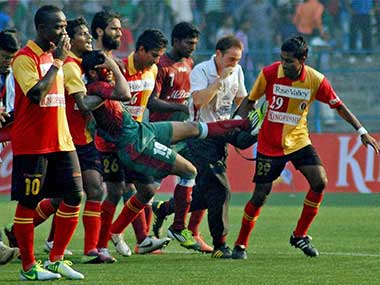When a club gets promoted to the English Premier League, they stand to gain a £120 million windfall. When a club is promoted from the Japanese J-League 2 to the first division, they get around £135,000. When a club is promoted from the Malaysian Premier League to the Super League, they get £63,000, plus an additional incentive of £33,000 — taking the total earnings to around £100,000. When a club is promoted from the I-League 2 to the I-League, they get — nothing. Expecting a cash injection of hundreds of millions of pounds like the top leagues is a bit too much. But that’s why we’ve mentioned other Asian leagues above, and the comparison with India’s football is absolutely ridiculous. Actually, there is no comparison. While Mohammedan Sporting and Rangdajied are clearly elated at winning promotion to the I-League, there is nothing to rejoice except for the fact that they’ll have the ‘honour’ of playing in India’s first division. [caption id=“attachment_949259” align=“alignleft” width=“380”]  Sporting Mohd will compete with East Bengal and Mohun Bagan in the next I-League. PTI[/caption] But how long can intangibles sustain a club? Honour and glory are not going to pay players’ salaries, nor the various other expenses that are attached to a football club. We spoke to Sporting’s President Sultan Ahmed, and he said: “We’ve recruited new players so that we can stay up the following season too. We also have to invest in a youth team and new infrastructure now that we’re in the I-League. All this doesn’t come for free.” Without an incentive from the AIFF, the club decided to announce its own prize money for promotion before the start of last season. “The club announced that the players and staff will divide among themselves Rs 10 lakh if we get promoted,” said their former coach Sanjoy Sen. Sen masterminded Sporting’s return to the I-League and even though he left, he says that the club have used his expertise to sign new players for next season. An AIFF source didn’t try to make any excuses about the fact: “To be honest, the AIFF doesn’t have any sort of money to pay out right now. And this is across the board — there are other football endeavours that are more important than I-League 2 prize money.” One of the reasons for bigger leagues having a considerable prize money is TV revenue. The EPL almost runs on that money alone, but football isn’t a huge number-puller for broadcasters in India, who seem to be intent on showing as much cricket as possible. “We’ve not been able to promote football — that is the main handicap. All the sponsors are running behind cricket. We need to rope in corporate help and we need government support. The least the AIFF can do is help us initiate dialogue with big sponsors,” said Ahmed. With the IMG-Reliance tournament all set to be the biggest football league in India, the I-League clubs are certain to take another hit. And even though Ahmed says there is a plan in place — which includes increasing ticket prices, their financial situation is still uncertain. “We have to depend on fans buying tickets, that’s all. All this promotion does is make the fans happy, and even though we’re glad about that, there are a lot of expenses which depend totally on the club. However, we’ve hired a few agents and we’re looking to get sponsors,” Ahmed said. Despite a lot of money across football in Europe, clubs sink without a trace on a regular basis. If those clubs aren’t making a profit, how do you expect an Indian club to do so? “To be honest, if — if we get the sponsors, we’re looking to break even. So if you think that there’s a profit from promotion, then no. There’s no profit,” reveals Ahmed. The AIFF does pay for travel and accommodation, but that’s hardly incentive enough for a club to play in the I-League. To top that, these division two clubs went through an audacious schedule to get here. “We played eight matches in 17 days initially, before playing another 10 matches spread over the season. That’s how we won I-League 2,” Sen said. There is a Rs 30,000 victory bonus from AIFF for every match in the I-League, in addition to the travel and accommodation expenses. But the promptness in payment isn’t very good. An example is outlined in this report , which highlighted the fact that the Rs 25 lakh Fed Cup prize money from the last season is still to be paid to East Bengal. Curse in disguise? Certainly looks like it.
How long can intangibles sustain a club? Honour and glory are not going to pay players’ salaries, nor the various other expenses that are attached to a football club.
Advertisement
End of Article
Written by Pulasta Dhar
If there is one place Pulasta Dhar wanted to live, it would be next to the microphone. He writes about, plays and breathes football. With stints at BBC, Hallam FM, iSport, Radio Mirchi, The Post and having seen the World Cup in South Africa, the Manchester United fan and coffee addict is a Mass Media graduate and has completed his MA in Broadcast Journalism from the University of Sheffield." see more


)

)
)
)
)
)
)
)
)



